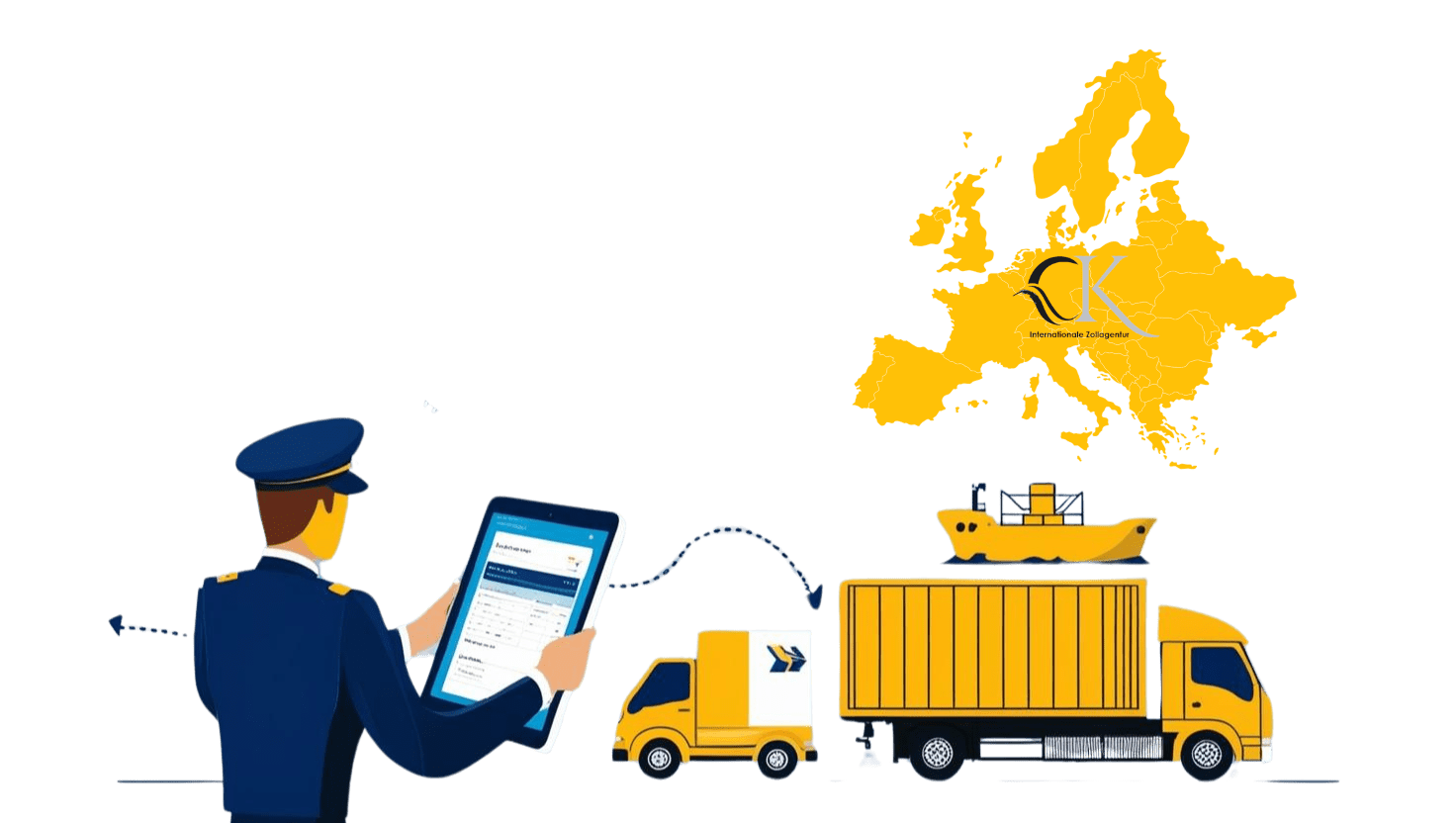Fiscal representation
- Home page
- Fiscal representation
Contact information
E-mail address
Phone number


Fiscal customs clearance made easy – maximum liquidity, minimum bureaucracy
Fiscal customs clearance is a crucial solution for companies that import goods from third countries into the EU and want to optimize their liquidity and efficiency. With our expertise, we offer you smooth and legally compliant processing that reduces both costs and administrative effort.
Your advantages at a glance:
✓
Improved liquidity:
No pre-financing of import turnover tax.
✓
Reduced administrative effort:
No need for a tax registration in the importing country.
✓
Legal compliance
Compliance with all EU regulations.
✓
Optimized logistics
Accelerated processes through professional fiscal representation.
How does fiscal representation work?
Import from a third country
Goods enter the Community via an EU member state.
↓
Processing by the fiscal representative
The fiscal representative assumes the necessary reporting and declaration obligations.
↓
Onward transportation to the country of destination
The goods are treated as an intra-Community supply.
Get started now – your fiscal customs clearance, our expertise!
Frequently asked questions
Companies that import goods from a third country into the EU and do not make taxable transactions in the importing country.
Fiscal customs clearance offers numerous advantages:
- ➤ More liquidity: The immediate payment of import turnover tax is waived.
- ➤ Fewer bureaucracy: A tax representative assumes all tax obligations.
- ➤ Cost savings: Through optimized processes, downtime and administrative costs can be reduced.
- ➤ EU-compliant: All processes correspond to the legal requirements of the European Union.
- ➤ Flexibility: Companies can import into countries where they are not resident.
Conclusion: Fiscal customs clearance is an ideal solution for companies that want to make their import processes more efficient.
- ➤ More liquidity: The immediate payment of import turnover tax is waived.
- ➤ Fewer bureaucracy: A tax representative assumes all tax obligations.
- ➤ Cost savings: Through optimized processes, downtime and administrative costs can be reduced.
- ➤ EU-compliant: All processes correspond to the legal requirements of the European Union.
- ➤ Flexibility: Companies can import into countries where they are not resident.
Conclusion: Fiscal customs clearance is an ideal solution for companies that want to make their import processes more efficient.
Fiscal representation is required if:
- ➤ Goods are imported from a third country into the EU.
- ➤ The company is not located in the importing country.
- ➤ The import turnover tax is not to be paid in the importing country, but in the country of destination.
Typical use cases:
→ Goods are imported into one EU member country and then transported to another EU country.
→ Companies want to reduce the administrative burden of imports.
→ The aim is to prevent the company from having to register for tax purposes in the importing country.
Important: A fiscal representation saves time and reduces the complexity of customs clearance.
- ➤ Goods are imported from a third country into the EU.
- ➤ The company is not located in the importing country.
- ➤ The import turnover tax is not to be paid in the importing country, but in the country of destination.
Typical use cases:
→ Goods are imported into one EU member country and then transported to another EU country.
→ Companies want to reduce the administrative burden of imports.
→ The aim is to prevent the company from having to register for tax purposes in the importing country.
Important: A fiscal representation saves time and reduces the complexity of customs clearance.
The following actors can act as fiscal representatives:
- ➤ Freight forwarders: Take over the entire logistics and customs clearance.
- ➤ Tax consultant: Specialized in the submission of VAT reports.
- ➤ Auditors and accountants: Ensure compliance with tax requirements.
- ➤ Lawyers: Support with complex tax and legal issues.
- ➤ Customs declarants: Focused on customs formalities and fiscal customs clearance.
Note: A tax representative must be registered for tax purposes in the importing country and meet the legal requirements.
- ➤ Freight forwarders: Take over the entire logistics and customs clearance.
- ➤ Tax consultant: Specialized in the submission of VAT reports.
- ➤ Auditors and accountants: Ensure compliance with tax requirements.
- ➤ Lawyers: Support with complex tax and legal issues.
- ➤ Customs declarants: Focused on customs formalities and fiscal customs clearance.
Note: A tax representative must be registered for tax purposes in the importing country and meet the legal requirements.
The following documents are required for fiscal customs clearance:
- ➤ Commercial or proforma invoice: Contains details on quantity, value and description of the goods.
- ➤ Customs declaration: With the corresponding procedure code (e.g. B. 42 for fiscal customs clearance).
- ➤ Evidence for intra-Community transport: waybills or delivery notes.
- ➤ VAT identification numbers (VAT identification number): The VAT number of the tax representative and the purchaser.
- ➤ Power of attorney: Authorizing the tax representative to act on behalf of the company.
Tip: Complete documentation ensures that the process runs smoothly.
- ➤ Commercial or proforma invoice: Contains details on quantity, value and description of the goods.
- ➤ Customs declaration: With the corresponding procedure code (e.g. B. 42 for fiscal customs clearance).
- ➤ Evidence for intra-Community transport: waybills or delivery notes.
- ➤ VAT identification numbers (VAT identification number): The VAT number of the tax representative and the purchaser.
- ➤ Power of attorney: Authorizing the tax representative to act on behalf of the company.
Tip: Complete documentation ensures that the process runs smoothly.
The differences between fiscal customs clearance and normal customs clearance:
- ➤ Import turnover tax:
- Fiscal customs clearance: The tax is only due in the country of destination.
- Normal customs clearance: The tax is levied directly in the importing country.
- ➤ Administrative effort:
- Fiscal customs clearance: A tax representative assumes the tax obligations.
- Normal customs clearance: The company must complete all tasks itself.
- ➤ Flexibility:
- Fiscal customs clearance: Ideal for companies operating in several EU countries.
- Normal customs clearance: Limited to the country of import.
Conclusion: Fiscal customs clearance is an efficient and cost-saving alternative to normal customs clearance.
- ➤ Import turnover tax:
- Fiscal customs clearance: The tax is only due in the country of destination.
- Normal customs clearance: The tax is levied directly in the importing country.
- ➤ Administrative effort:
- Fiscal customs clearance: A tax representative assumes the tax obligations.
- Normal customs clearance: The company must complete all tasks itself.
- ➤ Flexibility:
- Fiscal customs clearance: Ideal for companies operating in several EU countries.
- Normal customs clearance: Limited to the country of import.
Conclusion: Fiscal customs clearance is an efficient and cost-saving alternative to normal customs clearance.
Fiscal customs clearance is based on the provisions of EU VAT law and the respective national regulations. For a detailed overview, you can visit the official website of the European Commission.
Zusammenfassung der Inhalte